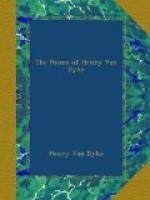BENHADAD: [Shaking his head.]
Excellent
well!
Most eloquent! But misty
in the meaning.
HAZAEL: [With cold decision.]
Then let me speak, O King,
in plainer words!
The days of independent states
are past:
The tide of empire sweeps
across the earth;
Assyria rides it with resistless
power
And thunders on to subjugate
the world.
Oppose her, and we fight with
Destiny;
Submit to her demands, and
we shall ride
With her to victory.
Therefore accept
The golden yoke, Assyria’s
gift of peace.
NAAMAN: [Starting forward eagerly.]
There is no peace beneath
a conqueror’s yoke!
For every state that barters
liberty
To win imperial favour, shall
be drained
Of her best blood, henceforth,
in endless wars
To make the empire greater.
Here’s the choice,
My King, we fight to keep
our country free,
Or else we fight forevermore
to help
Assyria bind the world as
we are bound.
I am a soldier, and I know
the hell
Of war! But I will gladly
ride through hell
To save Damascus. Master,
bid me ride!
Ten thousand chariots wait
for your command;
And twenty thousand horsemen
strain the leash
Of patience till you let them
go; a throng
Of spearmen, archers, swordsmen,
like the sea
Chafing against a dike, roar
for the onset!
O master, let me launch your
mighty host
Against the Bull,—we’ll
bring him to his knees!
[Cries of “war!”
from the soldiers and the people;
“peace!” from the courtiers and
the priests. The
King rises, turning toward NAAMAN, and seems
about
to speak. REZON lifts his rod.]
REZON:
Shall not the gods decide
when mortals doubt?
Rimmon is master of the city’s
fate;
We read his will, by our most
ancient-faith,
In omens and in signs of mystery.
Must we not hearken to his
high commands?
BENHADAD: [Sinking back on the throne, submissively.]
I am the faithful son of Rimmon’s
House.
Consult the oracle. But
who shall read?
REZON:
Tsarpi, the wife of Naaman,
who served
Within the temple in her maiden
years,
Shall be the mouth-piece of
the mighty god,
To-day’s high-priestess.
Bring the sacrifice!
[Gongs and cymbals sound:
enter priests carrying
an altar on which a lamb is bound. The
altar is
placed in the centre of the hall. TSARPI
follows
the priests, covered with a long transparent
veil
of black, sown with gold stars; RUAHMAH,
in white,
bears her train. TSARPI stands before
the altar,
facing it, and lifts her right hand holding
a
knife. RUAHMAH steps back, near the
throne, her
hands crossed on her breast, her head bowed.
The
priests close in around TSARPI and the altar.
The
knife is seen to strike downward. Gongs
and cymbals
sound: cries of “Rimmon, hear
us!” The circle of
priests opens, and TSARPI turns slowly to
face the
King.]




